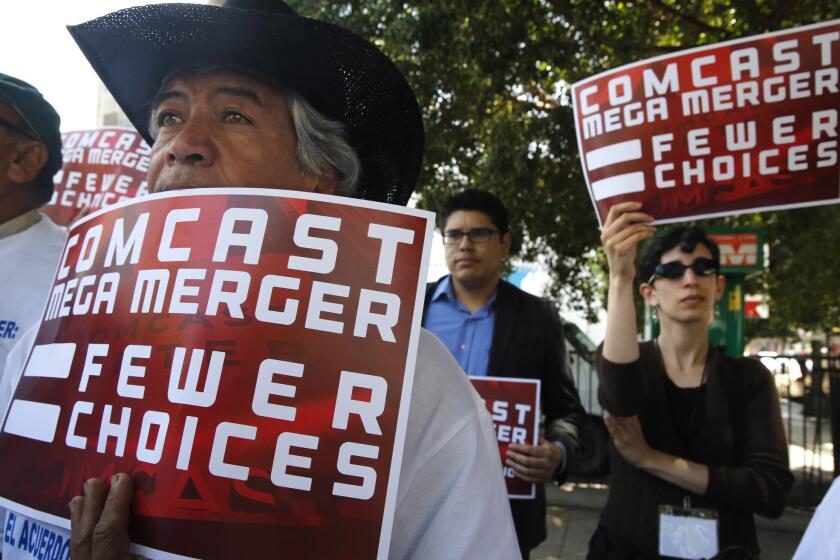Column: Spectrum, like other big companies, seeks to abandon its merger promises
- Share via
Back in 2016, the giant cable company Charter Communications made several promises required by federal regulators as conditions for the approval of a merger deal that would make Charter even more gargantuan.
Are you shocked that, now that the merger has long been completed, Charter is asking the Federal Communications Commission to rescind some of those conditions? Me neither.
Especially given that the result of any such FCC action would be to allow Charter, which operates its cable and broadband systems under the Spectrum brand, to raise prices on many of its internet users. (Full disclosure: The Times partners with Spectrum on a regular local TV news show.)
Why would any rational business take the time to get permission to do something they don’t intend to do?
— Matt Wood, Free Press
In approving Charter’s $88-billion acquisition of Time Warner Cable and Bright House Networks, the FCC forbade Charter to place data caps on its customers for seven years — that is, charge customers more if their internet use exceeds certain levels — or until mid-2023.
The commission also forbade Charter from charging streaming video providers such as Netflix for interconnections to its system during the same period.
In a petition it filed with the FCC on June 17, Charter is asking to drop those conditions as of May 2021, or two years early. The cable company cites an escape clause in an appendix to the FCC order, allowing it to ask permission to shorten the time frame to five years. The FCC set the initial public comment period on the petition to expire Tuesday, though its schedule has come under fire as too hasty.
There’s nothing new about companies that have made costly concessions to get what they want from regulators subsequently trying to renege on their promises down the line. I’ve reported on a couple of these cases just within the last few weeks.
T-Mobile promised jobs and technology to get approval for its Sprint merger. It’s already reneging
T-Mobile last month petitioned the California Public Utilities Commission to overturn several conditions imposed on the PUC’s approval of its merger with Sprint.
The big Northern California hospital chain Sutter Health also sought to delay court review of its 2019 antitrust settlement with California Atty. Gen. Xavier Becerra. (A state judge rejected that request.)
Both companies cited the COVID-19 pandemic as justification for their requests, but it’s a fair bet that if the pandemic hadn’t occurred, they would have looked for another excuse.
Consumer advocates are generally critical of data caps, especially for customers of fixed-broadband service, which doesn’t face the same bandwidth constraints as wireless communications, where they’re common.
Data caps raise the prospect of higher prices with the expansion of “bandwidth-intensive activities, such as streaming TV shows and movies,” as Consumers Union put it in 2015.
They’ve also proliferated as mergers have reduced broadband options for the average consumer. Further, COVID-19 lockdowns have increased household dependence on broadband usage, as more customers spend longer hours at home, using the internet not only for entertainment but work.
Charter’s petition has a couple of curious aspects. One is that it swears that it actually has no current plans to impose data caps on customers and has “no plan to do so” in the future, according to spokesman Justin Venech.
Giant Sutter Health says coronavirus crisis warrants renegotiating antitrust settlement. Don’t believe it
“I’d be skeptical,” says Matt Wood, general counsel of the consumer advocacy group Free Press. “Why would any rational business take the time to get permission to do something they don’t intend to do?”
Another aspect is that Charter says, in a public statement about its request, that it merely “seeks a level playing field so that we can continue to grow and provide superior service to our customers across the country.” Such major competitors as AT&T, Verizon and Comcast, you see, impose data caps or data allowances at various levels of usage.
Sure, if Charter can’t pursue a business model that its competitors can pursue, that’s not a level playing field. But it’s important to remember that this is a playing field that Charter graded itself — by agreeing to these conditions in order to get its merger approved.
Charter’s petition asserts that the streaming video business and its customers, which the merger conditions were purportedly imposed to protect, is “flourishing” — nay, exploding — despite the ability of big broadband providers to stifle subscribers’ data use.
Instead, Charter says, “video consumers reign supreme, demonstrating seemingly insatiable interest in video options.” Of course, viewer interest in video content would probably be mushrooming with or without data caps, so the relevance of this assertion is hard to fathom.
Charter’s bedrock claim is that the streaming video market, which accounts for the vast bulk of internet data use, has become “almost unrecognizable compared to what existed in 2016.” Therefore, the restrictions are outdated.
Government approval of a merger that creates the second-largest cable and Internet service behemoth in the country is a rich prize that shouldn’t be handed out casually.
If that were true, it wouldn’t say much for the business modeling staff of Charter Communications, which turned a profit of $3.5 billion on revenue of $29 billion in 2016, so presumably could have sprung for some seasoned prognosticators. (In 2019, the company earned $1.7 billion on $45.8 billion in revenue.)
But the notion that streaming video was going to grow strongly year by year could not have been much of a secret. It was part of the rationale for the Charter-Time Warner Cable merger itself. Charter is one of the few internet service providers that has focused entirely on broadband service, rather than jumping whole hog into entertainment content as Comcast did by acquiring NBC Universal and AT&T did by acquiring WarnerMedia.
The data caps imposed by some Charter competitors have been defended as so loose that the vast majority of customers won’t reach them. Comcast, for instance, raised its cap to 1 terabyte per month from 300 gigabytes in 2016; above that level, extra fees apply. A gigabyte is a little more than one billion bytes, and a terabyte is 1,000 gigabytes.
AT&T estimates that to reach 1 terabyte, a user would have to send and receive 11,000 emails, watch 142 hours of standard streaming video, 129 hours of hi-def video and 94 hours of super-hi-def 4k video, spend 345 hours in online gaming and upload 2,000 social media posts with photos, all in a single month.
Yet, “that’s an argument with an expiration date on it,” says Wood. “Ten years ago, people would have been saying, ‘Why would anybody need 25 megabits per second’” as an internet speed?
If there’s one truism that crosses all technological boundaries, indeed, it’s that the speed, capacity and usage of technological resources will grow. Today’s computers make yesterday’s look pathetic, and some of today’s smartphones even make computers look pathetic.
Comcast customers and their advocates may believe that the cable company’s reputation for wretched service was the key factor in federal regulators’ distaste for its proposed merger with Time Warner Cable, which has now been called off.
The imponderable in these usage estimates is video — as 4k streaming amounts to a larger share of video consumption, data use will grow commensurately — never mind the probability that even more data-heavy video technologies will eventually appear.
Broadband usage already has exceeded levels that internet firms thought were unreachable just a few years ago. In 2017, for example, Cox Cable said that only 2% of its users were reaching the 1-terabyte level. Last month, it placed the figure at 10%.
“The state of the art evolves very quickly in this field,” Wood adds. If the companies didn’t expect customers to hit 1-terabyte usage levels, “why would they set the cap there?”
Nevertheless, the smart money says that Charter’s petition to be relieved of its prior commitments will sail through the Republican-dominated FCC. The die was cast at the time of the original approval, which occurred under a Democratic-controlled commission.
GOP commissioner Ajit Pai voted against the approval because he objected to the conditions. The approval order “isn’t about competition, competition, competition; it’s about regulation, regulation, regulation,” a spokesman for Pai said at the time. “It’s about the government micromanaging the internet economy.” GOP Commissioner Michael O’Rielly voted in favor of the merger, but dissented from the conditions.
Both are still on the FCC — Pai having been elevated to chairman by President Trump. The chances that they’ll look kindly on Charter’s request are good.
Already the FCC has been accused of greasing the path for Charter’s request. That charge came, interestingly, from the conservative news organization Newsmax Media.
Newsmax, which would have a business interest in blocking data caps by internet service providers carrying its content, says the commission issued a notice setting the comment period for the request two months too early, based on the terms of the original merger approval. The FCC’s rush for comment creates “the appearance of undue favoritism” toward Charter, Newsmax argues.
That’s especially true given the prospects that the FCC might again come under Democratic control early next year, an eventuality that could complicate Charter’s request.
Regardless of Charter’s rationale for seeking to wriggle out from under the conditions, one counter-principle should be paramount: When a company makes promises to get a huge break from government regulators, it should be held to them. Period.
More to Read
Inside the business of entertainment
The Wide Shot brings you news, analysis and insights on everything from streaming wars to production — and what it all means for the future.
You may occasionally receive promotional content from the Los Angeles Times.














